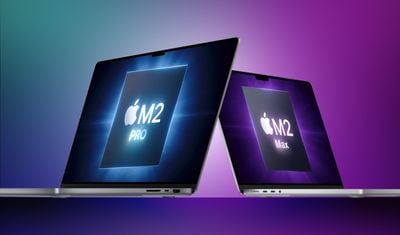Next-Generation MacBook Pros Rumored to Feature 'Very High-Bandwidth' RAM
Apple's next-generation 14-inch and 16-inch MacBook Pro models with M2 Pro and M2 Max chips will be equipped with "very high-bandwidth, high-speed RAM," according to information shared by MacRumors Forums member Amethyst, who accurately revealed details about the Mac Studio and Studio Display before those products were announced.

The current 14-inch and 16-inch MacBook Pro models are equipped with LPDDR5 RAM from Samsung, with the M1 Pro chip providing up to 200 GB/s of memory bandwidth and the M1 Max chip topping out at 400 GB/s. On a speculative basis, it is possible that the next MacBook Pro models could be equipped with Samsung's latest LPDDR5X RAM for up to 33% increased memory bandwidth with up to 20% less power consumption. This would result in up to 300 GB/s memory bandwidth for the M2 Pro and up to 600 GB/s for the M2 Max.
Bloomberg's Mark Gurman expects the next MacBook Pros to have few other changes beyond the M2 Pro and M2 Max chips. At this point, it seems likely that the laptops will be announced in November at the earliest with press releases on the Apple Newsroom site. Apple has launched new Macs in November multiple times in recent years, including the original 16-inch MacBook Pro in 2019 and the first three Macs with the M1 chip in 2020.
The current 14-inch and 16-inch MacBook Pro models with the M1 Pro and M1 Max chips were released in October 2021 and featured a complete redesign with a notch in the display and additional ports like HDMI, MagSafe, and an SD card reader.
Popular Stories
While the iOS 26.3 Release Candidate is now available ahead of a public release, the first iOS 26.4 beta is likely still at least a week away. Following beta testing, iOS 26.4 will likely be released to the general public in March or April.
Below, we have recapped known or rumored iOS 26.3 and iOS 26.4 features so far.
iOS 26.3
iPhone to Android Transfer Tool
iOS 26.3 makes it easier...
Apple recently acquired Israeli startup Q.ai for close to $2 billion, according to Financial Times sources. That would make this Apple's second-biggest acquisition ever, after it paid $3 billion for the popular headphone maker Beats in 2014.
This is also the largest known Apple acquisition since the company purchased Intel's smartphone modem business and patents for $1 billion in 2019....
Apple turns 50 this year, and its CEO Tim Cook has promised to celebrate the milestone. The big day falls on April 1, 2026.
"I've been unusually reflective lately about Apple because we have been working on what do we do to mark this moment," Cook told employees today, according to Bloomberg's Mark Gurman. "When you really stop and pause and think about the last 50 years, it makes your heart ...
Apple on Tuesday previewed 12 new shows and films that will be premiering on the Apple TV streaming service throughout 2026.
The new series:
Imperfect Women — March 18, 2026
Margo's Got Money Troubles — April 15, 2026
Widow's Bay — April 29, 2026
Maximum Pleasure Guaranteed — May 20, 2026
Cape Fear — June 5, 2026
Lucky — July 15, 2026
The new films:
Eternity — ...
Apple today began selling certified refurbished iPhone 16, iPhone 16 Plus, iPhone 16 Pro, and iPhone 16 Pro Max models on its online store in the U.S., with prices discounted by 12% to 22% compared to Apple's current or former pricing for the devices.
Here were Apple's starting prices when the devices launched in September 2024:
iPhone 16: $799
iPhone 16 Plus: $899
iPhone 16 Pro:...






















